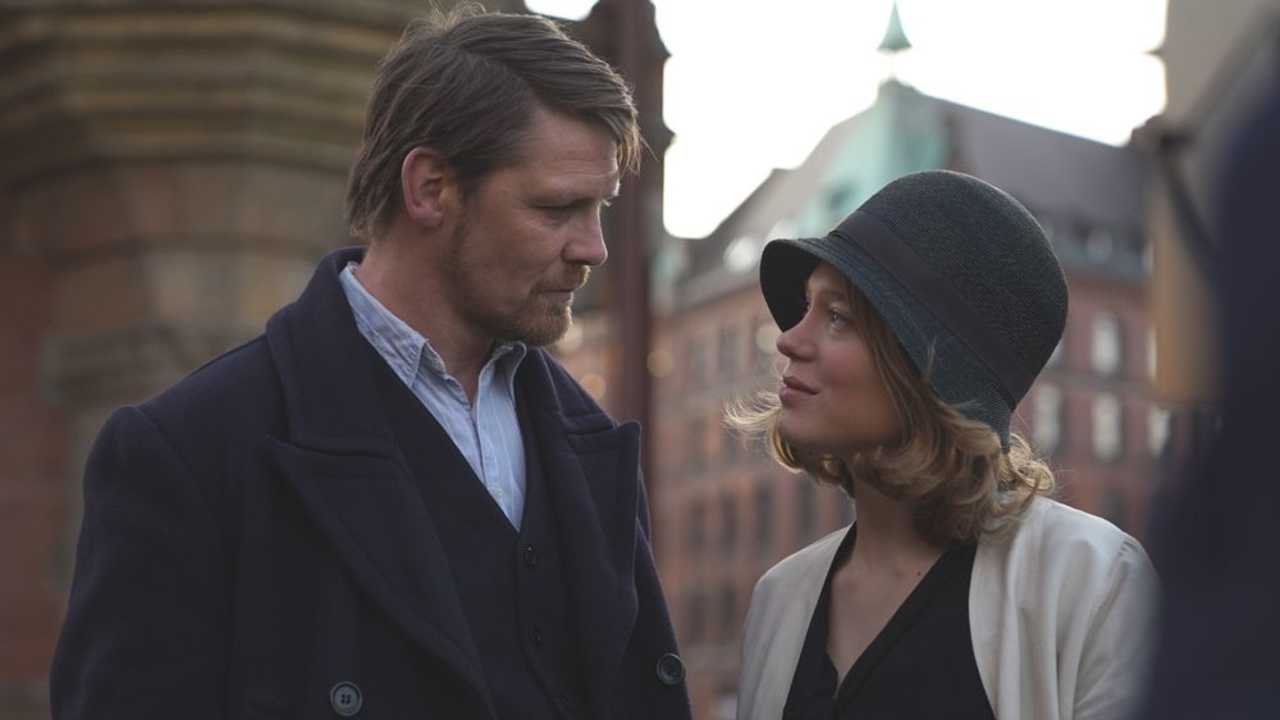The best way to describe Ildikó Enyedi’s latest film is a disappointing Martin Eden. Despite having just as much of an eye for beautiful imagery as Pietro Marcello’s recent triumph—and boasting a tall grizzled man-of-the-sea who seems to rise from the shore like Neptune ready to romance women as he waltzes his way through the streets of port towns with an air of grandeur—The Story of My Wife neither captures its lofty epic romantic aims nor justifies its length. At 169 minutes (40 minutes longer than Martin Eden) it’s puzzling how small in scope and ambition it feels.
The source novel by Milan Fust, which includes the addendum “The Reminiscences of Captain Storr,” has an interesting premise: sea captain Storr (Gijs Naber) makes a bet that he can get the first woman to walk in the door of the café he is seated at to marry him. He succeeds—the woman he sees is the confident and quippy Lizzy (Léa Seydoux, in the film’s best and most memorable performance)—but spends the rest of the story worrying over her infidelity to their marriage. This bit of irony considers that his confidence is masking deep insecurities. This meeting between the two is of course inexplicable, but characteristic of a fictional romance—something fantastical that ties itself to a predestined connection, something Enyedi already explored in her previous film On Body and Soul through dreams.
Lizzy and Storr’s conversation starts off playfully, Seydoux doing most of the tone-setting with her downward head-tilts and cheeky smiles, constantly making us wonder whether she’s egging him along or actually falling for him. The way she smokes a cigarette—looking Storr up and down, constantly evaluating his next move—plants a seed for her character’s disingenuousness. But her committed performance can’t compensate for the fact that this lumbering, repetitive relationship gets tiresome less than halfway through the film. As interesting as Seydoux tries to make her own character, Naber’s Storr does equal to hold things back.
Storr spends most of the movie cycling between a cast of random acquaintances and bouts of passion and jealousy that Lizzy may be duping him for one gentleman or another—most frequently recurring is the spoiled rich nephew of a millionaire, Dedin (Louis Garrel). Storr’s work as a ship captain and his occasional run-ins with Kodor are treated like filler material, the former acting as a reminder that Storr in fact does have a job and the latter as haphazard comic relief, both to hardly any consequence. The movie’s lackadaisical pacing of these diversions interspersed between Storr and Lizzy’s marriage do at least reprieve us of the couple’s mundane flip-flopping between sex and arguments.
Story of My Wife‘s saving grace might be the work from cinematographer Marcell Rev. Brilliant lighting, colorization, and framing certainly paint a pretty picture of early 20th-century Europe. The sun-dipped port-scaped and the contrasting of the blue waters with reds and yellows of the boats and shores feel transportive to the film’s time and place. The framing of Storr is notable and deliberate, often within confined geometries of doorways, hallways, mirrors, and in some cases two women, and paint the man in a stature and centrality that he doesn’t really deserve.
The film’s inability to capture any intrigue about itself is mainly from how much it hinges on a man and actor who hold nearly no gravitational pull—emotional, sexual, mysterious, artistic. Whatever sexual charisma could’ve been had in its various sex scenes are rendered stiff and dry. Even Seydoux, as attractive as she is, exists for most of the duration either to get naked or to argue. She slowly becomes a pure inconvenience to Storr’s life and Wife, despite a title suggesting its story is about (or of) her, shows no curiosity beyond what she means as this ambiguous mannequin who happened to say yes to Storr’s preposterous marriage proposal.
This is a disappointing follow-up to On Body and Soul, and in many ways works in opposite directions to that film. While Enyedi’s previous work had its heart set upon exploring metaphysical connection of love, Storr and Lizzy’s story never pontificates the happenstance of their meeting nor transcends the fragile cycle of doubt upon which their relationship rests. It is a movie content with simply handling the monotony of a distrusting marriage; at nearly three hours of runtime and a sparse shelf of ideas, that’s too low a bar to set.
The Story of My Wife screened at Toronto International Film Festival.

